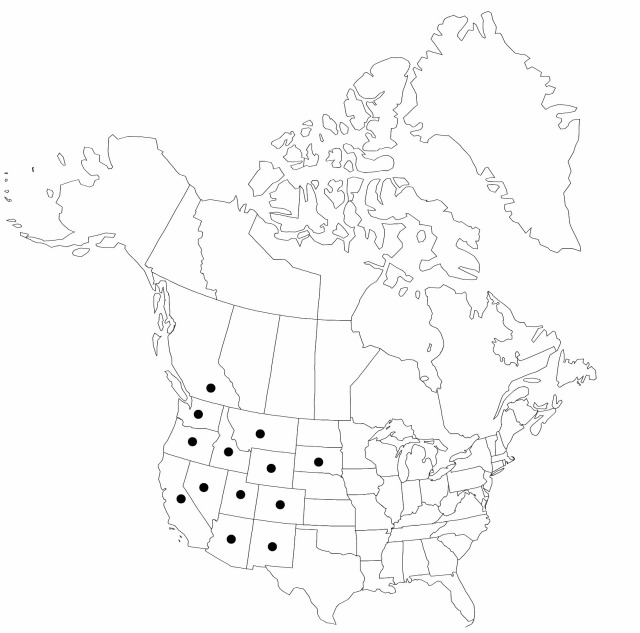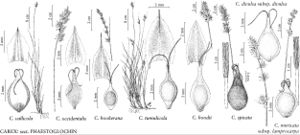Difference between revisions of "Carex vallicola"
Amer. J. Sci. Arts, ser. 2, 32: 40. 1861.
FNA>Volume Importer |
imported>Volume Importer |
||
| (5 intermediate revisions by 2 users not shown) | |||
| Line 6: | Line 6: | ||
|place=2, 32: 40. 1861 | |place=2, 32: 40. 1861 | ||
|year=1861 | |year=1861 | ||
| + | }} | ||
| + | |special_status={{Treatment/ID/Special_status | ||
| + | |code=F | ||
| + | |label=Illustrated | ||
}} | }} | ||
|basionyms= | |basionyms= | ||
| Line 11: | Line 15: | ||
|name=Carex rusbyi | |name=Carex rusbyi | ||
|authority=Mackenzie | |authority=Mackenzie | ||
| + | |rank=species | ||
}} {{Treatment/ID/Synonym | }} {{Treatment/ID/Synonym | ||
|name=Carex vallicola var. rusbyi | |name=Carex vallicola var. rusbyi | ||
|authority=(Mackenzie) F. J. Hermann | |authority=(Mackenzie) F. J. Hermann | ||
| + | |rank=variety | ||
}} | }} | ||
|hierarchy=Cyperaceae;Carex;Carex sect. Phaestoglochin;Carex vallicola | |hierarchy=Cyperaceae;Carex;Carex sect. Phaestoglochin;Carex vallicola | ||
| Line 37: | Line 43: | ||
-->{{#Taxon: | -->{{#Taxon: | ||
name=Carex vallicola | name=Carex vallicola | ||
| − | |||
|authority=Dewey | |authority=Dewey | ||
|rank=species | |rank=species | ||
| Line 51: | Line 56: | ||
|publication title=Amer. J. Sci. Arts, ser. | |publication title=Amer. J. Sci. Arts, ser. | ||
|publication year=1861 | |publication year=1861 | ||
| − | |special status= | + | |special status=Illustrated |
| − | |source xml=https:// | + | |source xml=https://bitbucket.org/aafc-mbb/fna-data-curation/src/2e0870ddd59836b60bcf96646a41e87ea5a5943a/coarse_grained_fna_xml/V23/V23_493.xml |
|genus=Carex | |genus=Carex | ||
|section=Carex sect. Phaestoglochin | |section=Carex sect. Phaestoglochin | ||
Latest revision as of 20:41, 5 November 2020
Plants without conspicuous rhizomes. Culms 12–60 cm, 1–1.3 mm wide basally, 0.5–1 mm wide distally. Leaves: sheaths tight, green, fronts hyaline; ligules less than 2 mm, wider than long; widest leaf blades 1–3 mm wide, papillose adaxially. Inflorescences with 5–10 crowded spikes, 0.5–3 cm × 5–8 mm; proximal bracts to 1(–3) cm; spikes with 2–10 ascending perigynia. Pistillate scales hyaline or pale brown with green 1–3-veined center, ovate, 2.8–3.2 × 1.8–2.6 mm, body slightly shorter than to length of perigynium, apex acute to short-awned. Anthers 1.8–2.3 mm. Perigynia brown, abaxial face 7–15-veined proximally, otherwise veinless or obscurely veined, 3.3–4 × 1.8–2.3 mm, base of perigynium spongy, thickened and longitudinally striate adaxially, spongy region 0.7–1 mm, margins serrulate to subentire distally; beak 0.5–1 mm, apical teeth 0.1–0.3 mm. Stigmas straight or slightly twisted, 0.05 mm wide. Achenes ovate to circular, 1.6–2.7 × 1.5–2 mm.
Phenology: Fruiting spring–early summer.
Habitat: Dry to mesic hillsides, grasslands, thickets, open forests
Elevation: 500–3000 m
Distribution

B.C., Ariz., Calif., Colo., Idaho, Mont., Nev., N.Mex., Oreg., S.Dak., Utah, Wash., Wyo., Mexico (Hidalgo).
Discussion
Selected References
None.
